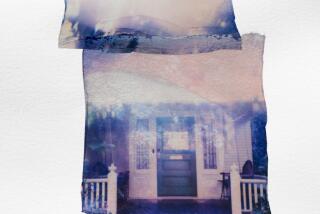We need the power to turn off fear
- Share via
WHEN THE LIGHTS went out on Monday afternoon, my first thought was that I’d waited too long to pay my DWP bill. I knew it was overdue; it was one of several I’d been juggling. Yet once I looked at it, I also knew the problem was bigger than mere personal economics. The bill was only six days late, not nearly long enough for the DWP to turn off my power.
Next I wondered if there might be a problem in my building, or perhaps my neighborhood. I stepped outside to take a look, but nothing was happening, just the usual midafternoon silence, birds and breeze and the low hum of traffic on the boulevard. When I came back in, my wife was on the phone with a friend who had also lost her power and reported that her children’s school was in the dark as well.
Hmm, I thought, mentally measuring distances; this is bigger than I imagined. I dug through a drawer and pulled out our hand-crank radio, the one we keep for when the earthquake hits. Switching it on and turning the handle, I couldn’t help but feel an edge of satisfaction, as if I were embarking on an adventure of some kind. I’d been looking at an afternoon of busywork; now, it seemed I’d been released. As I tuned in a news station and learned the extent of the outage, I began to envision an evening of candlelight, my wife and kids and I huddled in the living room, playing cards and telling stories, waiting out the darkness as if this were some other, more elemental time.
By now, it was time to pick up the children at school, so my wife and I got in the car, easing through lightless intersections, making careful turns. On the radio, a newscaster raised the possibility of terrorism, noting the Sept. 11 anniversary as well as the weekend’s vague threats against L.A. I’d dismissed those threats as grandstanding, but that breathless voice stirred a sense of menace inside me, stripping away the hooky-playing pleasure of the moment and replacing it with low-grade anxiety.
I don’t generally worry about terrorism; I believe the risk is overstated, manipulated for political ends. All you need do is look at New Orleans to understand that we have more to fear from nature -- not to mention our leaders’ inefficiency and lack of empathy -- than from any outside agency. Yet terror is a psychological mechanism, one that overtakes rationality. Despite my better instincts, my delight in the disruption of a routine workday fell prey to thoughts of chaos, uncertainty and alarm.
One of my fondest -- and most vivid -- childhood memories is of the 1965 New York blackout, which took place not long after I turned 4. I lived on the 10th floor of a prewar Manhattan apartment building, and I remember climbing four flights of stairs to a friend’s apartment, the entire world lighted by candles, as if it had been recast as a painting, reality bleeding into art. I remember my father coming home early, the soft stillness of our kitchen, the unimaginable darkness of the skyline as it settled into night. And I remember being jarred awake after 3 a.m. as the power came back on and all the appliances, the lights, the radio, kicked into operation, as if time, suspended, was picking up where it had left off.
Late Monday, after power had been restored, I related all this to a friend and lamented my loss of innocence, my inability to see L.A.’s blackout in those terms. “It was fun,” I said about 1965, to which my friend responded that now things aren’t so simple.
But I’m not sure I agree; New York in 1965 was also a city under threat -- the Cold War specter of nuclear annihilation. Still, you don’t see suggestions of a missile strike, or an invasion by the Soviets, mentioned in the coverage of that blackout.
Amid all the threats humans face, all the risks we bear, surely the most defeating are those we impose on ourselves. There is a high price to pay for allowing ourselves to live in terror, for taking every threat as prophecy. We lose sight of the moment, fail to recognize things for what they are. In the process, we let our freedom -- even the freedom to play hooky -- curdle into fear.
More to Read
Sign up for Essential California
The most important California stories and recommendations in your inbox every morning.
You may occasionally receive promotional content from the Los Angeles Times.














